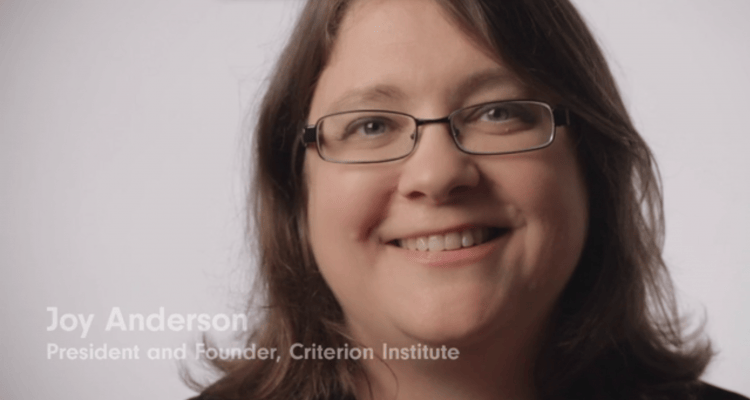The Wharton Social Impact Initiative’s Investing in Women program is pleased to bring the Wharton community a series of interviews to introduce thought leaders in the space and create a conversation around a more gender-informed economy. They have selected individuals from across the impact spectrum–multinational companies, impact investors, social entrepreneurs and more–to share their candid thoughts on trends, missteps and best practices.
It was just about a year ago that Joy Anderson, Founder and President of Criterion Ventures, joined the Wharton Social Impact Initiative (WSII) on campus for the first time. She and WSII Managing Director Sherryl Kuhlman, WG’01 had been connected for years through events like Convergence and Opportunity Collaboration, as well as through mutual contacts in the impact field. By the end of Joy’s visit, she and WSII had white-boarded a plan for a joint project focused on expanding the evidence base for gender lens investing, leveraging Wharton’s research strengths and Criterion’s industry knowledge to help inform this nascent space. A year later, WSII has led 16 student Fellows in hundreds of hours of research to advance our shared goal of building a more gender-informed economy through the Gender Lens Investing Insights project.
Among other great career moments, Joy Anderson landed on Fast Company’s 2011 list of “100 Most Creative People in Business.” Through her leadership at Criterion – which shapes markets to create good – Joy is a visionary force, changing the rules of our economy. And, as faculty on the leading Social Innovation Award programs, she advises the next generation of leaders. Joy’s insights have shaped hundreds of ventures, including Good Capital, a social investment firm she co-founded in 2006, and Village Capital.
Stay tuned to WSII’s Investing in Women work, as they will be rolling out the first of these research insights later this spring. And for now, enjoy the interview below, which discusses investing in women, a growing trend in impact investing. Read on to learn about how Joy is working to move from counting gender to valuing gender.
Q: What is the biggest misconception in the world of gender lens investing?
JOY ANDERSON: The biggest misconception is that gender lens investing is only about women entrepreneurs, or women-led businesses – which is a super important issue; it’s just not the only issue. It’s potentially not even the most systemically important issue. [WSII note: this is why we’re so excited for the work we’re doing with Criterion, looking at how we can make the entire economy more gender informed.]
Q: Talk about a great moment for you in this work. When did you feel like you were moving mountains?
ANDERSON: For me, it’s when I get that email or have that meeting where I feel – click! – the power has shifted, and I realize ‘I am being listened to, perspectives have been changed, paths have been opened.’ For example, when I was sitting with the IFC in Indonesia as they realized they could use their data, tools, and expertise to calculate a whole host of things to support gender lens investing. Or when I’ve made the case in such a way that the person can hear it and go do something. I score off the charts in empathy, and really low in persuasion, so I shouldn’t be good at sales; so to feel that someone else is changing how they’re thinking is SO cool.
Q: What is a lesson that you’ve learned from your work that you want to share with others?
ANDERSON: We underestimate how hard social change is. Asking yourself, ‘What do you do today in the face of not minimizing your overall ambitions?’ For example, today I have to empty my inbox – but somehow I have to justify to myself that it’s in service of changing how women are valued in finance! It’s challenging to identify the patterns to link the relatively small actions that humans can take and the broader systems level change that we’re tilting towards.
Q: What tools would you recommend for someone working in gender lens investing?
ANDERSON: The theory of change model, specifically as used by foundations, is very valuable. I believe that theory is what foundations have the most to teach us about. Impact investing should spend less time talking to foundations about moving capital, and more time talking to foundations about their approaches to social change. That would be a really nice change in the conversation.
Q: Who else do we need to know about in the gender lens space?
ANDERSON: The people who are going to make the future of gender lens investing are the people who understand gender. And those are the people we need to watch. Dr. Musimbi Kanyoro at The Global Fund for Women, Wellesley Centers for Women, Patricia Lamond at USAID. The leaders who come from what’s thought of historically as ‘the women’s movement’ are the ones who have the intellectual horsepower to translate what we actually know about gender into financial terms. I think they are the leaders that will make this more than pink-washing.
Q: What is one thing people should go read if they want to learn more?
ANDERSON: The Nature of Investing, by Katherine Collins. She is someone who has had the most influence on me in the last five years. She has the ability to translate finances into something that is knowable, understandable without making it basic or simplistic. She can take complex finance and have it make sense.
Editor’s note: The original version of this article appeared on the WSII Blog on March 2, 2016.


























